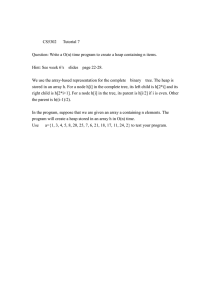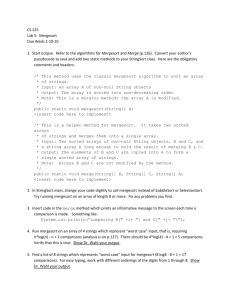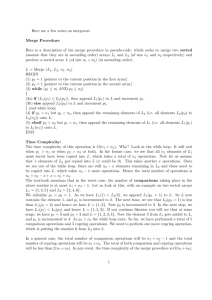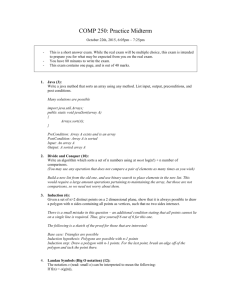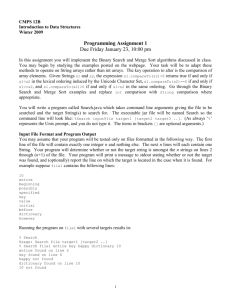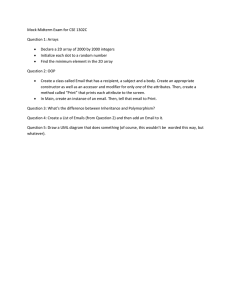Heap Sort and Merge Sort
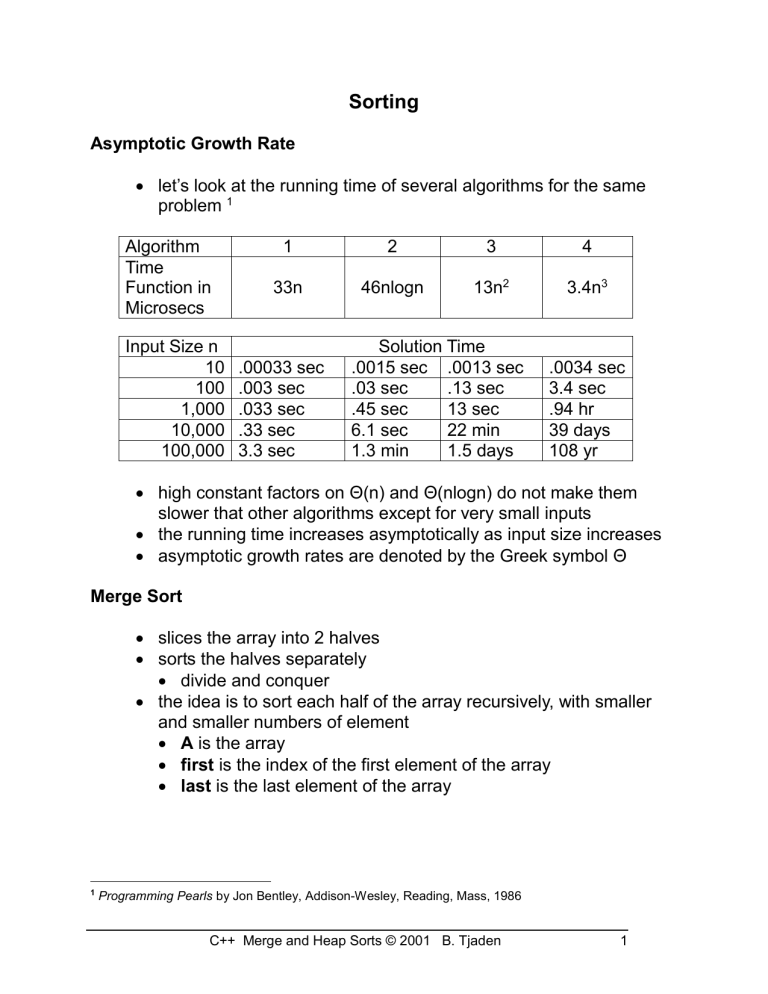
Sorting
Asymptotic Growth Rate
let’s look at the running time of several algorithms for the same problem 1
Algorithm
Time
Function in
Microsecs
1
33n
2
46nlogn
3
13n 2
4
3.4n
3
Input Size n Solution Time
10 .00033 sec .0015 sec .0013 sec .0034 sec
100 .003 sec .03 sec .13 sec 3.4 sec
1,000 .033 sec
10,000 .33 sec
.45 sec 13 sec
6.1 sec 22 min
.94 hr
39 days
100,000 3.3 sec 1.3 min 1.5 days 108 yr
high constant factors on Θ(n) and Θ(nlogn) do not make them slower that other algorithms except for very small inputs
the running time increases asymptotically as input size increases
asymptotic growth rates are denoted by the Greek symbol Θ
Merge Sort
slices the array into 2 halves
sorts the halves separately
divide and conquer
the idea is to sort each half of the array recursively, with smaller and smaller numbers of element
A is the array
first is the index of the first element of the array
last is the last element of the array
1 Programming Pearls by Jon Bentley, Addison-Wesley, Reading, Mass, 1986
C++ Merge and Heap Sorts © 2001 B. Tjaden 1
void mergeSort(Element [] A, int first, int last){
if(first < last){
int mid = (first+last)/2;
mergeSort(A,first,mid);
mergeSort(A,mid+1,last);
merge(A,first,mid,last);
} // end if
} merge(A,first,mid,last){
Element B[last+1];
int first1 = first;
int last1 = mid;
int first2 = mid+1;
int last2 = last;
// while both subarrays have more elements
// copy the smaller element into temporary array B
int index = first1;
for( ;(first1 <= last1) && (first2 <= last2); index++){
if(A[first1] < A[first2]){
B[index] = A[first1];
first1++;
}else{
B[index] = A[first2];
first2++;
} //end if else
} // end for
// finish off non-empty array
// if first array is not empty for( ; first1 <= last 1; ++first1,++index)
B[index] = A[first1];
// if second array is not empty for( ; first2 <= last 2; ++first2,++index){
B[index] = A[first2];
}
// copy the array B back into the original array A for(index = first; index <= last; index++)
A[index] = B[index];
} // end merge
C++ Merge and Heap Sorts © 2001 B. Tjaden 2
A[0] A[1] A[2] A[3] A[4] A[5] A[6]
6 4 8 3 7 5 1 mergeSort(A,0,3) mergeSort(A,0,1)
6 4 8 3
6 4 mergeSort(A,0,0) mergeSort(A,1,1)
6
4 merge(A,0,0,1) mergeSort(A,2,3)
4 6
8 3 mergeSort(A,2,2) 8 mergeSort(A,3,3) merge(A,2,2,3) merge(A,0,1,3) mergeSort(A,4,6)
3
3 8
3 4 6 8
7 5 1 mergeSort(A,4,5)
7 5 mergeSort(A,4,4) mergeSort(A,5,5)
7
5 merge(A,4,4,5) 5 7 mergeSort(A,6,6)
1 merge(A,4,5,6) merge(A,0,3,6)
1 5 7
1 3 4 5 6 7 8
C++ Merge and Heap Sorts © 2001 B. Tjaden 3
the asymptotic order of the worst case number of comparisons for mergesort is Θ(nlogn)
it requires Θ(n) extra work space for merging
mergesort is not an in-place sorting algorithm
mergesort does about 30% fewer comparisons in the worst case than quicksort
mergesort is very close to optimal
Heap Sort
Why bother learning another sort?
quicksort
rearranges elements in the original array
cannot be sure of making an even subdivision of the problem
therefore, bad worst case
mergesort
guarantees an even subdivision
has nearly optimal worst case
can’t rearrange elements in original array
needs auxiliary workspace
heapsort
rearranges elements in original array
optimal in terms of growth rate
combines advantages of merge and quick sorts
a heapsort uses a heap to sort an array of items that are in no particular order heapsort(int [] array,int last)
insert original array into a heap
continuously rebuild the heap until each subtree has a parent > its children
array[0] is the largest element in the heap for(k = 0; k<n; k++)
swap the largest item in the heap region with array[last]
decrement last
heapRebuild(array,0,last)
C++ Merge and Heap Sorts © 2001 B. Tjaden 4
original array A:
6 3 5 9 2 10 after heapRebuild(A,2,6)
6 3 10 9 2 5 after heapRebuild(A,1,6) 6 9 10 3 2 5 after heapRebuild(A,0,6)
10 9 6 3 2 5 after making A a heap:
10 9 6 3 2 5 last swap(A[0],A[last])
5 9 6 3 2 10
last after heapRebuild(A,0,4) 9 5 6 3 2 10
last after swap(A[0],A[last])
2 5 6 3 9 10
10
last after heapRebuild(A,0,3)
6 5 2 3 9 10
10
last after swap(A[0],A[last]) 3 5 2 6 9 10
10 last after heapRebuild(A,0,2)
5 3 2 6 9 10
10 last after swap(A[0],A[last])
2 3 5 6 9 10 last after heapRebuild(A,0,1) 3 2 5 6 9 10 last after swap(A[0],A[last])
2 3 5 6 9 10 last
C++ Merge and Heap Sorts © 2001 B. Tjaden 5
